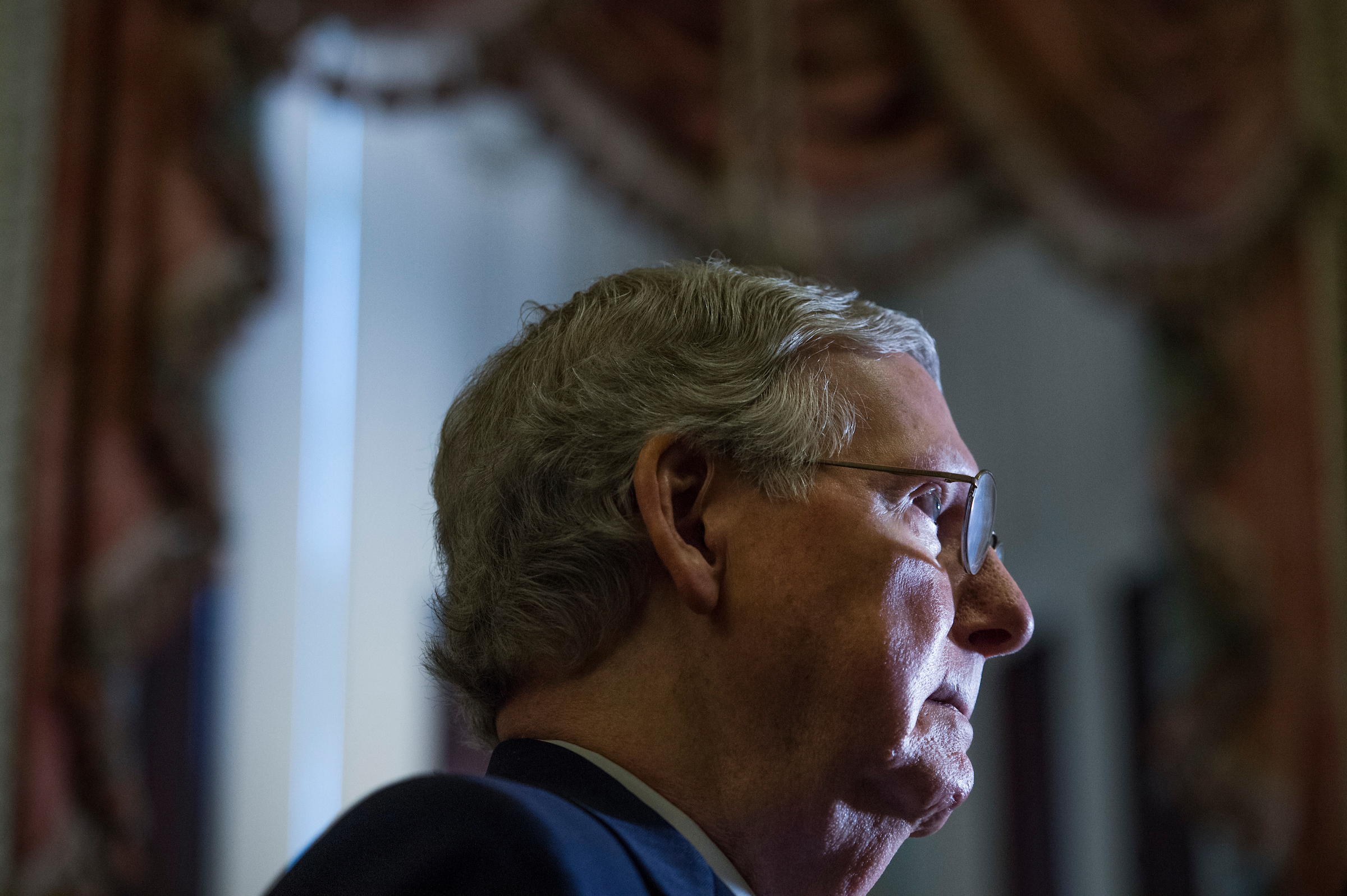Senators Skeptical of Leadership Health Care Timeline
Major sticking points remain as members await more information.

With several sticking points remaining, rank-and-file Republican senators and aides are skeptical of Senate GOP leaders’ latest goal of holding a vote on legislation to overhaul the U.S. health insurance system as early as next week.
Adding to the headache for Senate Majority Leader Mitch McConnell is an amendment pushed by a pair of conservatives that they say is necessary for their support. While it has some appeal in the conference, others have lingering questions over what impact the provision would have on sicker individuals.
Senate Majority Whip John Cornyn of Texas told reporters on Monday evening that updated text for the bill that would repeal and replace large portions of the 2010 health law could be released this week. A report from the nonpartisan Congressional Budget Office on the proposal could then come early next week, teeing up a vote next Thursday or Friday.
But some Republicans appear skeptical of that timeline.
“We’re going to want to see the amendments, and we’re also going to want to make sure that we have a chance to see what the score is and understand it. And then also, we’re going to want to be able to talk to people in the industry,” Sen. John Hoeven of South Dakota told reporters. “It’s going to take some time to work through that and understand that.”
Sen. Ron Johnson, who criticized McConnell’s attempt last month to hold a vote on the legislation just days after making the text of the bill public, said the timeline was up to leadership.
“I don’t know what we are going to be voting on. Apparently they are going to reveal that to us on Thursday,” the Wisconsin Republican told CQ Roll Call.
While a number of amendments are under consideration, much of the attention in the chamber has been on a proposal from Sens. Mike Lee of Utah and Ted Cruz of Texas that would allow insurers to offer a plan that is not compliant with the health law, so long as they offer one that is.
It has received early support from some GOP members who appear undecided on whether to support the legislation, like Sen. Jeff Flake of Arizona.
“I do like the Cruz proposal,” he told reporters.
Sen. Marco Rubio, R-Fla., also said the amendment could “allow Florida to have a vibrant individual market.”
One concern raised by health policy experts and moderate lawmakers over the provision from Cruz and Lee is whether such a system would raise insurance costs for sick individuals. Flake said that could be addressed through “more direct subsidies.”
“Dealing with it now, we have the same thing, it’s just subsidized by other people’s premiums,” he said.
Sen. Bill Cassidy, R-La., previously raised concerns over whether the amendment would require an insurer bailout using taxpayer funds.
Lawmakers are pushing several other amendments for possible inclusion in the revised draft. Sen. Mike Rounds, for example, is lobbying for a measure that would allow individuals eligible for a group plan to get federal tax credits to use on the individual market.
Leadership “is telling me that it may take a while to get that amendment scored, so I’m putting pressure on them to get it scored so I can take a look at it too,” the South Dakota Republican said. “I think there’s a lot of us that are frustrated, just because it takes a lot of time to get this completed.”
Rounds said he did not like the original language proposed by Cruz and Lee, but added that leadership was considering making changes to it.
When asked about those changes, Lee said “that’s news to me.”
Aside from the measures affecting insurance plans offered on the individual market, the current proposal to phase out the law’s Medicaid expansion beginning in 2021 and impose a stricter growth rate on the entitlement program over the next 10 years also continues to be a major sticking point. Both have received significant push back from states impacted by the growing prescription drug abuse problem, as well as those states with largely rural populations.
“I think the bigger issue for some of the Medicaid states right now is one, the amount of funding for the opioid crisis. That’s a very big deal for a lot of our members. And then secondly, what the inflation rate is going to be,” Senate Republican Conference Chair John Thune of South Dakota said.
Navigating the divisions over the Medicaid provisions could be the most difficult task for McConnell, as conservatives like Sen. Patrick J. Toomey of Pennsylvania would likely oppose rolling back the stricter growth rate.
“Making Medicaid mathematically and economically sustainable can and should be done in a way that preserves the level of care,” he wrote in an op-ed in USA Today. “The Senate proposal takes some steps in this direction, and we hope that further flexibility is included.”
But other members continue to highlight it as a major concern.
“It just doesn’t meet the requirements that we laid out in terms of making sure that people have access to not only health care and affordable health coverage,” Hoeven said of the current draft. “Between Medicaid and refundable tax [credits], we’ve got to make sure that those are sufficient for low income people to have access to coverage.”
Lauren Clason contributed to this report.





